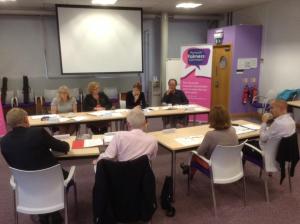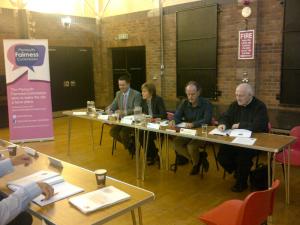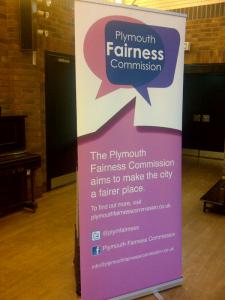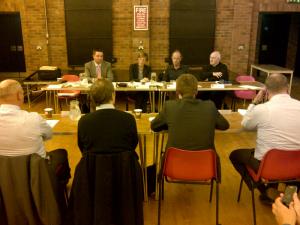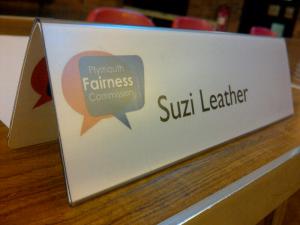Blog Archives
A Message from the Chair
The Plymouth Fairness Commission has come a long way since its start in April 2013. We have reached the crucial stage in what the Commission set out to do – our recommendations have been delivered to the city.
Our work as a Commission is complete for now, but there is a new beginning, turning those recommendations into reality. The work for Plymouth has only just started. The Commissioners and I listened to the people of Plymouth and made our recommendations based on what we learned. Now it is time for the change to begin.
In order for this to be a success, the city needs to work together and show how it is transforming. The people of Plymouth will want to know what progress is being made. That is why we have asked specific organisations to report publicly on what they are doing to make Plymouth fairer. Their response to our recommendations and their achievements in implementing them over the coming months and years will be on this website.
Some of the aspects of fairness we have drawn attention to do not just require organisations to do something, rather they are about how we as citizens live together. We hope that the relational changes we have highlighted, the need for greater social connection, tolerance and kindness, will also begin to impact on our lives.
The Plymouth Fairness Commission will reunite in 2015 to review the progress made by the city. We understand that making Plymouth a fairer city will not be an overnight transition; nothing of the scale and significance we have advocated is achieved immediately. But the blueprint is there and the will to effect change is already being demonstrated.
Finally, a thank you to the very many people and organisations that have contributed to our work over the past year, the Commissioners and I are truly grateful. You helped us set the vision. Making it a reality is a task for all.
Dame Suzi Leather
Select Committee; Local Procurement
In order to help boost the local economy in Plymouth, the Fairness Commission held a select committee event on Local Procurement. They invited expert witnesses from the industry to discuss the issues faced in the area.
The commissioners welcomed Steve Scott – CSP Coaching LLP, Paveway Performance and Plymouth Chamber of Commerce, Richard Thomas – Web Consultant, Debbie Southwould – Mitchell Architects and Craig McArdle – Head of Joint Strategic Commissioning at Plymouth City Council.
One of the main topics of discussion focused on Sell2Plymouth, a website dedicated to procurement in the city, connecting local buyers and sellers together. It was argued that, although it is serving its purpose to an extent, there is room for improvement to the software which can only really be sorted to its full effect if full ownership of the software can be achieved.
It was also stated how local procurement is more difficult because it means that businesses are likely to have to shop around. Bigger companies more often have a number of services under one roof, therefore less effort is required from the buyer. One expert described it as ‘a question of hearts and minds’. You know it is good to buy local, and probably even want to buy local, but is it providing your business with something better than what can be got with less money and less effort?
It was decided that in order for local procurement in Plymouth to be a success, everyone needs to be behind it. Otherwise it will be an uphill struggle for all of those who do support buying locally. It was also stated that it is not just up to the public sector to buy local, it should also be the responsibility of the private sector too.
Thank you to our commissioners and the expert witnesses who joined us.
Select Committee; Dementia
Yesterday we had our select committee on the issues surrounding Dementia in Plymouth.
The discussion proved to be successful in addressing problems of dementia within Plymouth, but it is also worth noting that a lot of these issues are nationwide so a wider strategy could be put in place.
The main topics which came up include:
- The number of people with dementia in the UK will increase by 40% by 2020 – will Plymouth be able to cope with the demand?
- The time it takes and the ability to diagnose needs to improve – often people don’t know there’s a problem because they’ve grown with it – “That’s how she’s always been”
- There needs to be an all-round better understanding of dementia – from individuals to businesses
- Plymouth has started its journey to put in place 18 measures to become a ‘dementia friendly city’
- There is a lack of support workers in Plymouth and they need a better wage
- There needs to be a leaflet of services available to people with dementia and their carers specific to Plymouth – not just online as it isn’t accessible to everyone
“We’re good at adding years to life, but not adding life to years”
It may also be interesting to read this article from the Guardian as it mirrors a lot of what was said at both the select committee yesterday and our visit to Crownhill Memory Cafe, where we spoke to dementia sufferers and their carers. Although the main issues are nationwide, there is still a lot that Plymouth has the power to change in order to become a dementia friendly city.
Many thanks to Ian Sherriff, University of Plymouth and Alzheimer’s Society Trustee, Vice Chair of the Plymouth Dementia Action Alliance, Dr Stephen Pearson, Consultant in Old Age Psychiatry, Helen Phillips, Researcher at Plymouth University, Keith Bucknell, Cared for his mother who is now in a home and is studying for a research Masters in Dementia and Claire Journeaux and Angela Pedlar, both from Plymouth Community Healthcare
Select Committee; Housing
On Friday we held our Select Committee meeting on Housing. Some interesting points were raised and have got us on the way to putting together recommendations to make Plymouth a fairer city. We would like to thank Ian Maitland from South West Landlords Association, Mike Taylor from Plymouth Access to Housing and Matt Garrett and Phil Mitchell from Plymouth City Council (Housing depts). They provided an excellent Expert Panel and gave the commissioners a great insight into the issues faced in Plymouth. Also a thank you to commissioners Dame Suzi Leather, Ian Potts, Kevin Elliston and Father Sam Philpott for being on our select committee panel for the event.
Plymouth Fairness Commission wants to hear your views: Events across the city are announced…
Select committee hearings, listening events, satellite meetings and surveys will be held across the city from today, as part of the Plymouth Fairness Commission’s Summer of Listening.
The independent body, set up to tackle issues of inequality in the city, is heading out into communities to speak to scores of Plymouthians about the issues they face.
Nine public select committee hearings will be held, each focusing on a different theme to be discussed by a panel of experts on the subject. Members of the public are invited to attend, or submit a question to be put to the experts by emailing info@plymouthfairnesscommission.co.uk. The first five hearings will be held as follows:
- Financial Inclusion – Monday 9 September 2013 at Welcome Hall, Fore Street, Devonport PL1 4DN
- Skills and Business – Wednesday 11 September 2013 at Engage Plymouth, St Levan Road, Milehouse PL2 3BG
- Housing – Friday 13 September 2013 at Harewood House, Ridgeway, Plympton PL7 2AS
- Food – Tuesday 17 September 2013, Astor Room, Plymouth Guildhall PL1 2AD
- Isolation and Dementia – Tuesday 1 October 2013, Welcome Hall, Fore Street, Devonport PL1 4DN
- Local Procurement – Wednesday 2 October 2013, Baylis Suite, Tamar Science Park PL6 8BX
Hearings are also planned to discuss discrimination, education and mental health.
Commissioners will also be heading out to more than 30 ‘satellite meetings’, where they’ll meet with specific communities and groups to ensure their views are heard. From older people and religious groups to young carers, military families and people with disabilities, the commissioners aim to listen to as many views as they can in order to build up an accurate picture of fairness in the city.
Meanwhile, researchers from Plymouth University will be carrying out street surveys on behalf of the Fairness Commission in five locations; Mutley Plain (Monday 2 Sep), Stoke Village (Tuesday 3 Sep), Plympton Ridgeway (Tuesday 3 Sep), Royal Parade (Wednesday 4 Sep) and Crownhill shopping area (Thursday 5 Sep). An e-survey has also been sent to organisations and academic bodies to find out about any inequalities in Plymouth and collate any data that may support their findings.
Public listening events will also be held across Plymouth, giving members of the public the opportunity to share their views and suggest ways in which the city could be a fairer place. Details of these events will be announced shortly.
Fairness Commission Chair Dame Suzi Leather said: ‘Our Summer of Listening is giving us the opportunity to speak to individuals and organisations from across Plymouth to hear first-hand the issues that affect them, while also taking into account the hard data that points to areas of inequality in the city.
‘We are listening, and listening widely. We hope that people from across the city will speak up and share their views with us to ensure we tackle the right issues. We want practical ideas for making Plymouth a fairer city.’
Launch of the Summer of Listening
Plymouth Fairness Commission has launched a three-month ‘Summer of Listening’ to find out what people think is unfair about the city.
The Summer of Listening will use a range of public events, satellite meetings and surveys to find out first-hand from Plymouthians where the biggest inequalities lie. It was agreed as the best way of creating a clear picture of the fairness issues in Plymouth when the Fairness Commission met last week (Wednesday 17 July).
The Summer of Listening follows the Commission’s initial Call for Evidence, the responses to which shaped the themes that will be explored over the next three months. The themes include education, employment, the cost of living, and loneliness, amongst others.
The views, ideas and evidence collected during the Summer of Listening will form part of a report, to be prepared by Plymouth University on behalf of the Fairness Commission. The report will help to inform the recommendations that the Commission will ultimately present to city leaders in March 2014.
Fairness Commission Chair Dame Suzi Leather said: ‘Our Summer of Listening will give us the opportunity to speak to individuals and organisations from across Plymouth to hear first-hand the issues that affect them, while also taking into account the hard data that points to areas of inequality in the city.
‘This information will be vital in shaping our recommendations, which we hope will make Plymouth a fairer place for everyone to live and work.’
Full details of the listening events will be released soon. More information on Plymouth Fairness Commission can be found at www.plymouthfairnesscommission.co.uk.
Join the fairness debate on Twitter @plymfairness or at www.facebook.com/plymouthfairnesscommission

